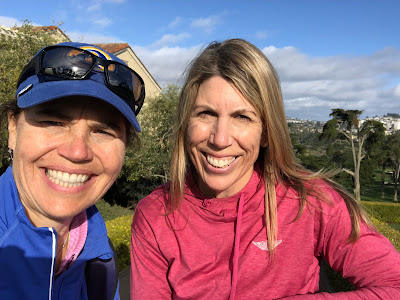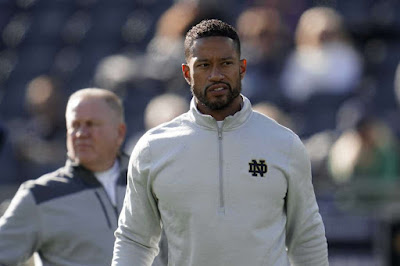Embracing Gretchen Rubin's 21 for 2021—reading for pleasure for 21 minutes a day—is, hands down, the best thing I did this past year. I began 90% of my days by reading for 21 minutes. The timer on my iPhone defaults to 21:22. We don't call it smart technology for nothing! If I had to choose between a morning walk and reading, I went with those 21 minutes and my book or magazine. I can make a strong argument that this literary discipline became a spiritual one. This happy habit will not go away. Thank you Gretch!
 |
| While getting destroyed on the Lake course during my Christmas Eve round with Monica, I came up my idea for 2022. Hoping it will help me play better on this course, damn it. |
Rubin is the New York Times best selling author of The Happiness Project and co-host of one of my favorite podcasts, Happier. Since 2020 she has challenged her followers to implement a personal habit that plays with that number of the year—walk for 20 minutes a day in 2020 and in 2021, read for 21 straight minutes. For Rubin, reading 21 minutes is anything but a challenge. This is a woman who posts a monthly photo of a stack of books she has eaten for breakfast. Yes, I gaze at her reading lists with envy. I find myself asking how she does it, but thanks to this daily habit, I have a better understanding.
What reading with a timer taught me is that while I thought I had a good habit of reading before, I didn't. I approached daily reading blindly, which is fine. But truth be told, I was selling myself short. I probably read for 10 to 12 minutes at most, but reading for a full 21 took me much further and deeper into the text. Many times, I wanted to hit reset for an added 21:22 Work and other obligations always call. My brother has told me to keep a journal list of the books I have read; it will only encourage me to read more.
As a teacher and a writer, the words of Heather Treseler invited me to think differently about my 21 for 2021. In the article "My Search for Elizabeth Bishop" she writes
At the university where I have up to 150 students and advisees each year, I have learned that getting my students to write better is, in part, a matter of helping them figure out what to read. In a world of clickbait and newsfeeds, I want them to have the necessary pleasure of rapt absorption, deep engagement that comes from being “too shy to stop” in books and the worlds they open. These reflexes — of imagination and reflection — ensure we are thinkers, not simply information consumers whose interests are carefully mapped and mercilessly merchandised."
Her realization gave me pause to think about the reading I do and the reading I encourage in the classroom. For example. in Sports and Spirituality, we tackled a challenging and lengthy essay with the "Silent 10"—10 minutes of sustained silent reading. It took some arm wrestling, but eventually each one settled into the routine. And yes, they probably heard more about my 21 for 2021 both directly and indirectly. I couldn't help but share excerpts of my latest book "Rafa: The Autobiography of Rafael Nadal" as so many of his stories and insights resonate with the curriculum....and I was proud that I carried this through!
Rubin's 22 for 2022 challenge is 22 minutes of rest. The reveal—featured on Episode 357— explains its importance.
Research shows that rest is an essential element of working well and working smart. Rest helps us to think and increase our productivity; rest can refresh the mind and replenish mental energy. Research also suggests also that taking regular breaks raises your level of engagement which, in turn, is highly correlated with productivity. It also boosts creativity by helping people make unexpected connections and stay open to different possibilities.
I can't and won't argue with the importance of rest. I appreciate that she has listed the many forms that rest can take, providing a number of ways one can achieve this goal. We might be a better society, and definitely a better high school if we practiced 22 for 2022. However, I'm not willing to commit. Sorry Gretch.
Instead, I will most likely read for 22 in 2022 and...drum roll.... my goal is to play 22 new golf courses in 2022. This will be a fun and interesting challenge, and it's one I know I can accomplish as I will be paying greens fees at 12 new ones in Ireland in July. God willing! I am excited for the new places and perspectives I will gain by hitting the same ball (more or less) with my same clubs on new links.
And, being that I don't write and teach about Sports and Spirituality—but actually live it!—my goal is to attend Mass at 22 new Catholic churches. I am committed to Sunday mass at my parish but I always enjoy the opportunity to pray with a new community in a different, often historic, and beautiful setting.
Similar to my tracking the books I read, I look forward to doing the same with my golf courses and Catholic parishes.
I don't know a person who isn't hopeful that 2022 will be a gentler, kinder, healthier and happier year. 22 is my lucky number. It's my favorite number. Beyond books, golf and communal worship, I am excited for the blessings it will bring. Happy New Year!
Photo Credits
Rafa






















